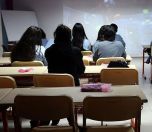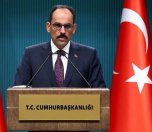Click to read the article in Turkish
Education and Science Labourers Trade Union (Eğitim Sen), issued a statement yesterday (September 12) on the debates regarding mixed education.
As regards the abolition of the article foreseeing mixed education in Anatolian High Schools, vocational and technical education centres and vocational education centres following multiple programs, the Trade Union said: "it should be interpreted as the abolition of arrangements that may hinder practices other than mixed education".
As may recalled, the Ministry of National Education (MoNE) had abolished the article foreseeing mixed education in multi-program Anatolian High Schools, vocational and technical education centres and vocational education centres through an amendment in the Regulation amending the Regulation governing Closure and Naming.
In the court case launched against MoNE on grounds that the subject article might mean for mixed education not to be exercised in schools other than those indicated, the court had ruled for suspension of execution.
In a statement, MoNe pointed out that the abolition of the article was due to the suspension of execution decision and recalled the article enshrined in the Basic Law on National Education, reading: "In schools, mixed education of girls and boys is the fundamental [principle]. However, depending on the type of education, facilities and difficulties, certain schools can be separated as only for girls and only for boys."
Presidential Spokesperson İbrahim Kalın pointed out that mixed education was continuing, and added: "Aside of this, non-mixed education can also be provided."
"The way to practices other than mixed education being opened up"
The trade union also recalled the aforementioned article no 15 "In schools, mixed education of girls and boys is the fundamental [principle]. However, depending on the type of education, facilities and difficulties, certain schools can be separated as only for girls and only for boys" of the Basic Law on National Education.
"The law clearly emphasizes that co-education is the principle however they manipulate the reference to "type, facilities and difficulties" noted in the second part and open many Anatolian high schools and Anatolian imam & preacher schools for girls.
"In the aforesaid regulation MoNE does not define which types of schools would be spared for girls and boys according to which facilities and difficulties, hence it paves the way for practices other than co-education. Absence of a definition in that respect would facilitate removal of any school out of co-education system."
"All three types of schools in the basket of arbitrariness"
The Union has interpreted the abolishment of the provision in the regulation as "inclusion of all three types of schools in the basket of arbitrariness".
"In the regulation regarding these schools there was a clear reference to "co-education" therefore they were not excluded from co-education. However, according to the amendment these schools may be spared only for girls or boys "when need be".
"If MoNE was sincere" ...
Eğitim Sen said; "If MoNE had been sincere in its statement it would have adopted the provision according to Article 15 of the law no 1739, and regulate it as "co-education shall be the principle in all educational institutions of all levels", rather than abolishing it.
"Therefore deletion of the provision totally from the regulation rather than adopting it should be interpreted as abolishment of regulations which may prevent practices other than co-education."
"Practices other than co-education"
The Union also reacted to the statement delivered by the Presidential Spokesperson.
"The statement reveals that the real intention is to increase practices other than co-education and to sustain the reactionist tendency in education."
"Debates over co-education are taking place not on the basis of pedagogical and scientific data but political references and the adverse consequences are born by our students.
"Therefore one of the most fundamental priorities of the forthcoming period is to stand against the reactionary and pro-market transformation in the field of education and to ensure that all students are able to access education in the type of schools they wish to attend." (BK/TK)






